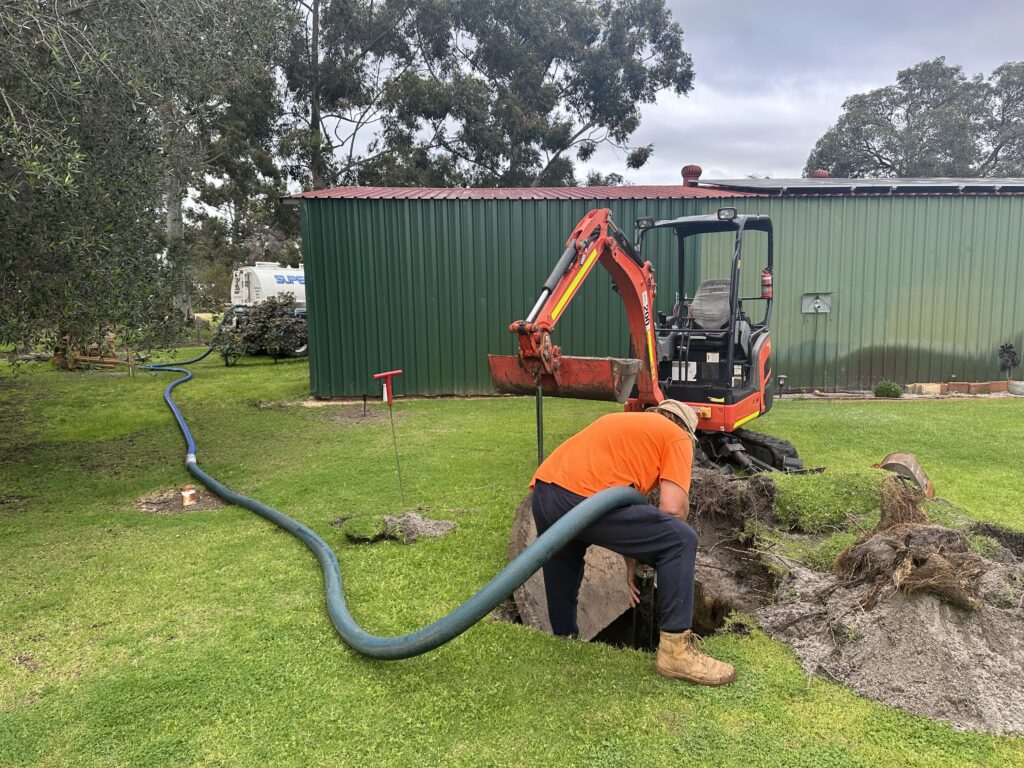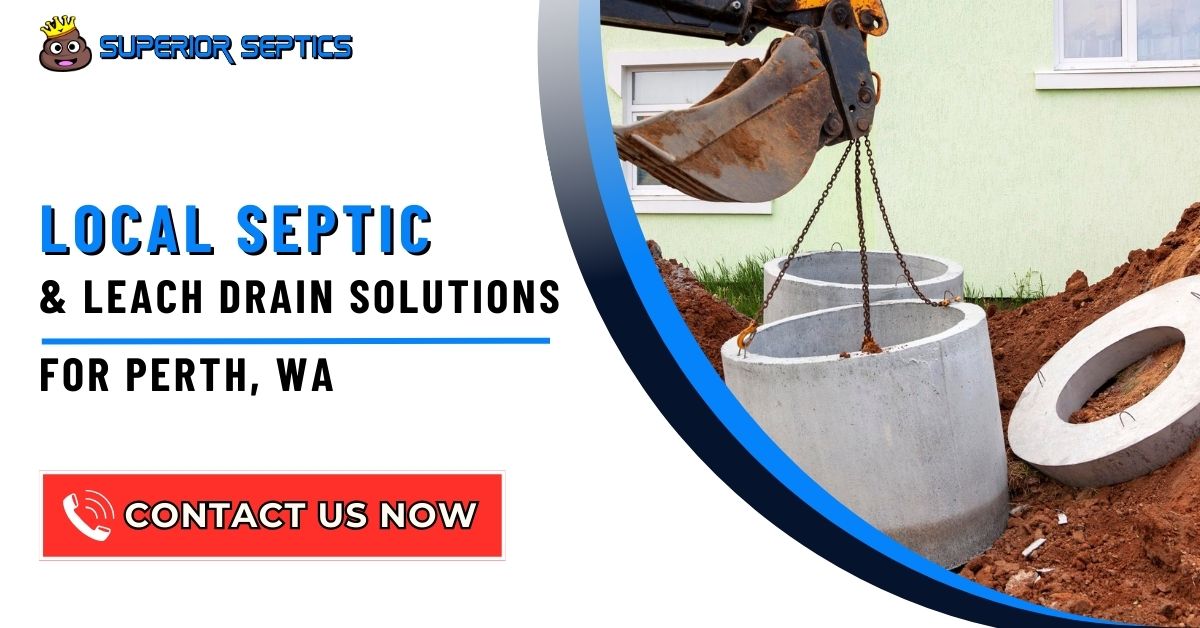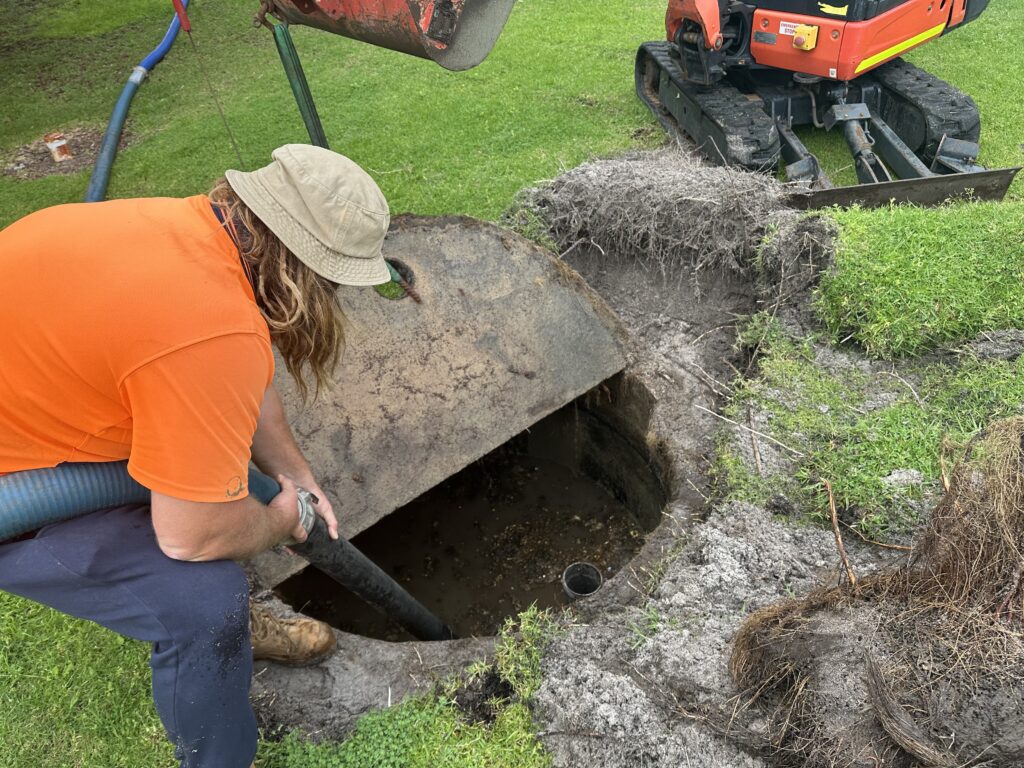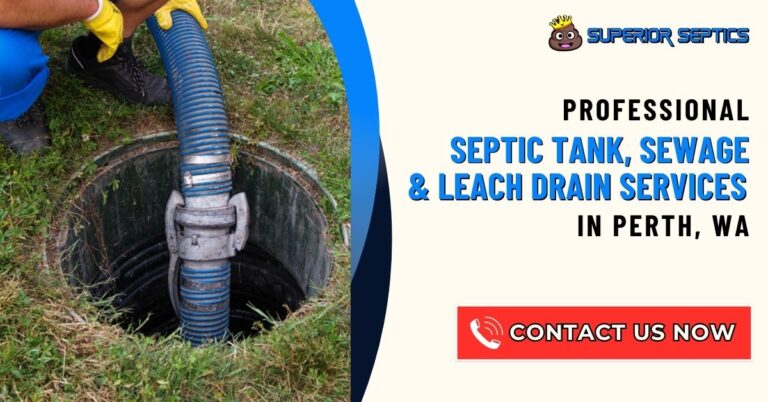Septic Tank Maintenance Tips to Avoid Costly Repairs!
It’s exciting to see so much new housing being built in the Perth metro area, but there’s something you should know. Many of these new developments will use septic systems for decades before they will be hooked up (if ever!) to the sewer system.
This means many people are moving into homes with septic systems for the first time, and they have very little idea about how the system works or how to maintain it.
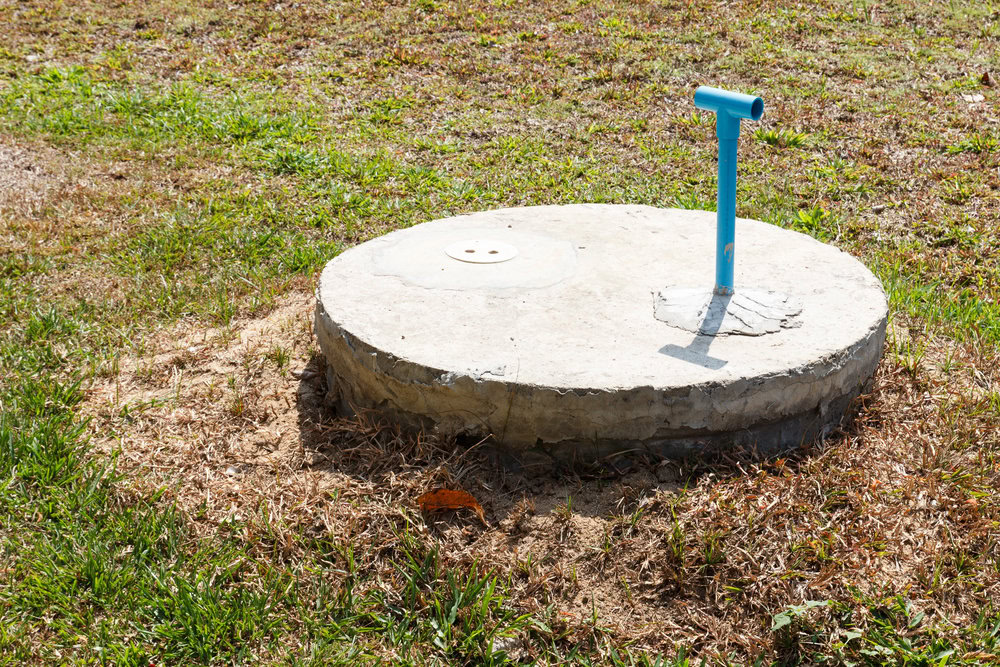
How Do I Keep My Septic Tank Healthy?
Septic tank systems have been around for more than 150 years. When installed and used properly, the natural bacteria found in waste will help maintain the septic tank’s health.
Keeping the average household septic system healthy involves a few basic steps:
Never dump anything that isn’t biodegradable into your septic tank system.
Keep the drain field clear of trees and cars.
Divert rainwater from the drain field.
Monitor water use.
There are more details to the above but keep reading!
We will offer tips to help you get the longest life possible out of your septic system.
What Are the Do's and Don'ts of Owning a Septic Tank?
This can be quite a lengthy list and if you wish to read all the do’s and don’ts, you should check out this article.
In short, however:
- DO schedule regular maintenance.
Don’t put harsh household chemicals (bleach, drain cleaners, etc.) down the drains.
DO conserve water, especially during heavy rains.
Don’t pour grease down the drain. Instead, put it in a plastic bag or paper towel and then place it in the trash.
DO use biodegradable products. Look for those marked “safe for septic tanks”.
Don’t plant trees or park cars on the drain field. Avoid planting trees with invasive roots. If you aren’t sure about the tree you want to plant, call the experts at Superior Septics.
If you stick to these guidelines, you will enjoy your septic system’s many years of trouble-free service.
Some people swear by certain septic tank additives that promise to introduce “healthy bacteria” to the septic system to help it break down human waste.
By design, your septic system already does this. It seems most people use these additives in hopes of avoiding regular pumping.
The truth is that we’ve never seen any of these additives do any harm. We’ve also not seen any real benefit to them either.
If you feel good about these additives, feel free to use them, but they won’t take the place of regular maintenance.
What Should I Put in My Septic Tank Every Month?
How Often Should a Septic Tank be Pumped?
The average household septic system will need pumping every 3-5 years.
This can vary depending on the size of the septic tank, the number of people living in the home, and whether the septic system has been abused.
Why Regular Maintenance is Essential for Your Septic System
Over time, it’s inevitable that sludge and scum will build up in your septic tank. Wastewater (called effluent) will flow out of the tank and into the leach field.
For your septic tank to operate properly, you must have it pumped out regularly. It’s at this time that an inspection of the overall system, including the leach field, can go a long way toward preventing and spotting possible problems with the system early on.
You can preserve the natural balance of the system and keep it in tip-top shape by removing buildup and sludge layers and maintaining the disposal area.
When you pump your septic tank on a regular basis and follow good septic system maintenance tips, you can avoid costly repairs, such as replacing the septic tank or major repairs to the leach field.
Know The Signs of Septic Trouble:
When to Call an Expert
Sometimes, despite your best efforts, you can experience problems with your septic system. Some of the most common signs that will require a septic service provider, such as Superior Septics, to evaluate and inspect your septic system include:
Loud, gurgling noises from drains
Toilet water that looks grey or brownish
Sewage backups
Standing water in the drain field or lush grass
Horrific smells from the drains
It might simply be that your septic tank system is full and it needs pumping.
If you see any of these signs, call the experts at Superior Septics right away. We can stop a small problem from becoming a costly repair.
What NOT to Flush: Protecting Your Septic Tank
There is a long list of items you should NEVER flush to protect your septic system, including:
Anything NOT organic (paper towels, cat litter, cleaning chemicals, bleach, sanitary napkins or other feminine hygiene products, diapers, wipes, etc.)
Some items that seem organic but will cause clogs, including cooking oil, fats and grease, solid food waste, and coffee grounds.
Never put harsh chemicals, such as drain cleaners, down the kitchen sink.
Never flush wet wipes, even those that say they are flushable. They will clog your septic system.
Medication of any kind should be thrown in the trash.
Never put large food items in the garbage disposal. Make a compost bin or scrape the plate into the trash before washing.
If you have any questions about whether or not a certain item is safe for your septic system, throw it in the trash or call the experts at Superior Septics.
A septic tank contains three layers. Sludge, which will sink to the bottom of the tank, the grease or scum that covers the top, and wastewater (effluent) which is slowly distributed through the drain field.
If the septic tank system is not pumped regularly, the scum blanket on top will slowly rise to the top and can clog the lines that release wastewater to the drain field.
This disrupts the entire system and can cause blockages, damage to the drain field, and even system failure.
We suggest keeping maintenance records. It will be easier to track when your septic system was last pumped out and when you should call the pros at Superior Septics for the next.
Regular Pump Outs: The key to a Healthy Septic System
Keep Your Drainfield Clear and Functioning
While solid material will sink and settle in the septic tank, wastewater will flow out to the drain field and slowly be absorbed by the dirt.
Parking cars or placing heavy items (such as storage sheds) in this area is a big no-no. If during heavy rains you have issues with drainage, a sump pump or a storm drain might be necessary.
This is another reason why you shouldn’t plant trees with invasive roots. For a list of drainfield-safe trees, contact the friendly staff at Superior Septics.
Schedule Professional Inspections and Maintenance
Professional inspections, cleaning, and maintenance are a vital part of keeping your overall septic system healthy and in good working order.
By following the maintenance tips listed here, including the do’s and don’ts of owning a septic tank, you can avoid most problems and save money in the long run.
Why Choose Superior Septics for Your septic Maintenance Needs
With more than 10 years of experience, we are Perth’s local experts for septic solutions!
We are a family-owned business that understands the needs of Perth residents.
Whether you have a question about the size of the septic system your new home needs or if you need an emergency pump out, we are your trusted septic tank service provider in Perth.
Call the experts today and stop wondering whether your septic system is in good shape.
We offer competitive waste management pricing to all Perth customers.
Call us today for a free quote!

